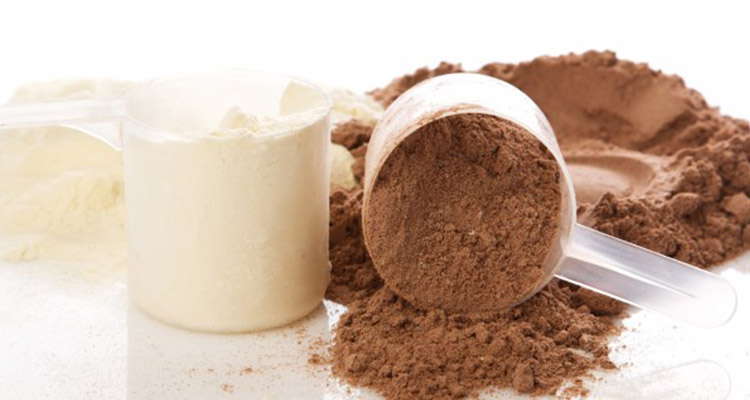Protein is a real jack-of-all-trades when it comes to supporting health. From building stronger muscles and improving hormone production to strengthening the immune system and supporting hair and nail growth, there’s little this macronutrient doesn’t do.
Every cell in your body contains protein, so meeting your daily protein requirements is essential for good health. Whether you get your protein from animal sources, plants, or protein shakes, how much of it you need depends on a host of factors, including age, activity level, and goals such as weight loss or muscle gain.
Real-Life Recommendations for Protein Intake
The U.S. government sets the recommended dietary allowance (RDA) for protein, as well as for vitamins, minerals, fiber, fats, and carbohydrates. The RDA for protein starts at a low of around 0.8 grams per kilogram (0.4 grams per pound) of body weight per day for sedentary people, and increases along with increasing levels of activity.
 ://www.bodybuilding.com/images/how-much-protein-should-you-consume-every-day-1-700xh.jpg”/>
://www.bodybuilding.com/images/how-much-protein-should-you-consume-every-day-1-700xh.jpg”/>
For most people, these guidelines are too low. Whether you’re an endurance runner or a gym rat, you need more than the average amount of protein to support the recovery and repair of your muscles. In fact, studies overwhelmingly suggest that athletes need more than twice the amount of protein than sedentary people.[1]
You can find different and often higher recommendations for grams of protein per unit of body weight. The more intensely you exercise, the more you should aim for the high end of that range.
The increase in protein recommended for more active people helps repair tissue and replenish amino acids used for fuel during intensive activity. The work part of resistance training stimulates muscle synthesis or growth, but it also increases muscle breakdown—so much so that when you exercise in a fasted stated, you can break down more protein than your body is building. Consuming protein immediately after working out can help you balance muscle breakdown and muscle growth. One specific protein, the amino acid leucine, stimulates the cellular pathway responsible for muscle growth.
You May Need More Protein If…
Older adults can also benefit from more protein in their diet. As we age, our bodies become less efficient at using this macronutrient. Over time, this protein deficiency can lead to decreased strength and loss of both muscle mass and mobility. Staying physically active and eating a minimum of 1.2 grams of protein per kilogram of body weight can help you stay in fighting shape well into your golden years.[2]
Vegetarians and vegans should also pay close attention to how much and what kinds of protein they consume. Except for soy and quinoa, most vegetarian and vegan sources of protein are considered incomplete because they don’t contain all nine essential amino acids necessary for protein synthesis. By consuming 1.5-2.0 grams of protein per kilogram of body weight along with a varied diet of legumes, grains, and beans, vegans and vegetarians can take in enough essential amino acids to build and repair muscle tissue.
 ://www.bodybuilding.com/images/how-much-protein-should-you-consume-every-day-2-700xh.jpg”/>
://www.bodybuilding.com/images/how-much-protein-should-you-consume-every-day-2-700xh.jpg”/>
You may have heard rumors that eating too much protein can cause kidney damage, liver failure, or osteoporosis. In fact, there is no evidence that a reasonably high protein intake has any negative effect in healthy individuals.[3]
Protein and Weight Loss
Higher-protein diets may help you lose weight, too. Studies have shown that consuming protein can increase feelings of satiety. What’s more, since your body must work extra hard to digest protein, it can also increase the number of calories you burn.[4] Consuming 1.2-1.6 grams of protein per kilogram of body weight can also help you maintain muscle mass even as you reduce your overall calorie intake.[5]
Does the Timing of Your Protein Intake Matter?
Bodybuilders are always trying to figure out what time during the day (or night) is best for consuming protein. Should you take it before, during, or after exercise? Should it be the first thing you eat every day, or the last thing? It’s really a question of how much protein you consume in a 24-hour period—not exactly when you consume it.
Whether you shovel down a dozen scrambled eggs in the morning, slam a protein shake immediately after working out, or eat a tub of cottage cheese before bed, your top priority should always be to make sure you’re consuming your daily protein quota, as outlined above.
 ://www.bodybuilding.com/images/how-much-protein-should-you-consume-every-day-3-700xh.jpg”/>
://www.bodybuilding.com/images/how-much-protein-should-you-consume-every-day-3-700xh.jpg”/>
The rate of muscle protein synthesis remains elevated for 3-5 hours after you consume protein.[6] By consuming about 20 grams of protein 3-4 times per day, you can continuously stimulate protein synthesis while suppressing protein breakdown.[7] Studies have also shown no real benefit to consuming more than 20 grams of protein at any meal.[6, 8]
That’s not to say that consuming more protein than that is a complete waste. While the extra protein won’t increase rates of protein synthesis, it can help minimize muscle breakdown, be stored in your body’s “amino-acid pool” for later use, or serve as a fuel source during longer-duration, higher-intensity workouts.
References
- Thomas, D. T., Erdman, K. A., & Burke, L. M. (2016). Position of the academy of nutrition and dietetics, dietitians of Canada, and the American College of Sports Medicine: Nutrition and athletic performance. Journal of the Academy of Nutrition and Dietetics, 116(3), 501-528.
- Bauer, J., Biolo, G., Cederholm, T., Cesari, M., Cruz-Jentoft, A. J., Morley, J. E., … & Visvanathan, R. (2013). Evidence-based recommendations for optimal dietary protein intake in older people: a position paper from the PROT-AGE Study Group. Journal of the American Medical Directors Association, 14(8), 542-559.
- Manninen, A. H. (2004). High-Protein Weight Loss Diets and Purported Adverse Effects: Where is the Evidence? Journal of the International Society of Sports Nutrition, 1(1), 45.
- Halton, T. L., & Hu, F. B. (2004). The effects of high protein diets on thermogenesis, satiety and weight loss: a critical review. Journal of the American College of Nutrition, 23(5), 373-385.
- Pasiakos, S. M., Cao, J. J., Margolis, L. M., Sauter, E. R., Whigham, L. D., McClung, J. P., … & Young, A. J. (2013). Effects of high-protein diets on fat-free mass and muscle protein synthesis following weight loss: a randomized controlled trial. The FASEB Journal, 27(9), 3837-3847.
- Burd, N. A., van Vliet, S., van Loon, L. J., Beals, J. W., & Paluska, S. A. (2017). Sustained Postprandial Muscle Protein Synthesis Rates after Protein Ingestion in Healthy Young Males. The FASEB Journal, 31(1_supplement), 652-2.
- Mamerow, M. M., Mettler, J. A., English, K. L., Casperson, S. L., Arentson-Lantz, E., Sheffield-Moore, M., … & Paddon-Jones, D. (2014). Dietary protein distribution positively influences 24-h muscle protein synthesis in healthy adults–3. The Journal of Nutrition, 144(6), 876-880.
- Symons, T. B., Sheffield-Moore, M., Wolfe, R. R., & Paddon-Jones, D. (2009). A moderate serving of high-quality protein maximally stimulates skeletal muscle protein synthesis in young and elderly subjects. Journal of the American Dietetic Association, 109(9), 1582-1586.
Gym2k.com Articles






Leave a Reply
You must be logged in to post a comment.